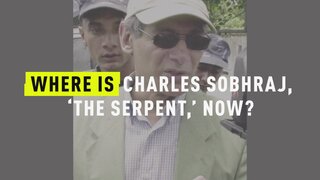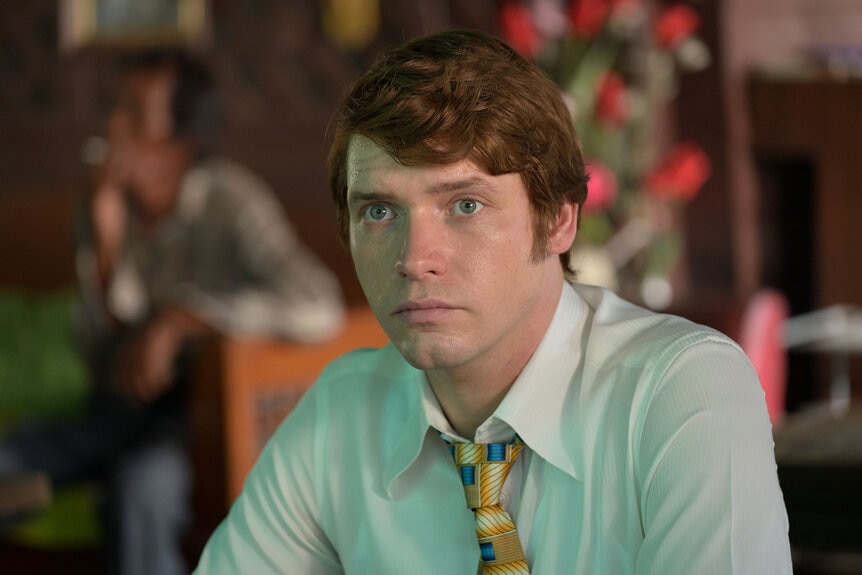Create a free profile to get unlimited access to exclusive videos, breaking news, sweepstakes, and more!
Where Are Herman Knippenberg And Angela Kane From 'The Serpent,' Now?
The intertwining stories of real-life figures Charles Sobhraj, aka “The Serpent,” Dutch diplomat Herman Knippenberg, and his then-wife Angela Kane inspired the new Netflix series — but what are they doing now?

The twisted, tense story of a French serial killer preying on trusting tourists along Asia’s “hippie trail” in the 1970s and the diplomat on his trail is brought to vivid life in the BBC-Netflix drama “The Serpent,” which was released on the streamer on April 1 after airing on the British network earlier this year.
The intertwining stories of real-life figures Charles Sobhraj, aka “The Serpent,” and Dutch diplomat Herman Knippenberg, who tracked him with his then-wife Angela Kane, began when the envoy learned of the 1975 murders of students Henk Bintanja, 29, and his fiancée, 25-year-old Cornelia Hemker. The younger couple, found strangled and burned, became Sobhraj’s victims after they met him in Hong Kong and were invited to visit him in Bangkok.
(Spoilers below)
Sobhraj, a seasoned con man and jewel thief, typically targeted Western tourists, often befriending them with his girlfriend, Marie-Andrée Leclerc, before drugging and robbing them. An elusive target, he would sometimes swipe his victims' passports to travel more easily under assumed names. He's believed responsible for at least 12 murders.
As they began to investigate Sobhraj, Knippenberg and Kane gathered a trove of information on the thief and murderer, which was handed to Interpol and helped lead to the killer’s arrest and conviction. Sobhraj served more than 20 years in an Indian prison — often bribing his way into special treatment and even briefly escaping multiple times — before being released in 1997 and returning to France. But after visiting Nepal, where there was still an open murder case in which he was a suspect, in 2003, he was arrested yet again, convicted and sentenced to life imprisonment. He lost two appeals and remains behind bars in Kathmandu; Leclerc, who served time for the murder of Israeli tourist Alan Aaron Jacobs, died of cancer in 1984; Knippenberg and Kane divorced, then she went on to a major career at the United Nations while he held several diplomatic posts outside of Thailand.
“I decided that it was absolutely imperative to stop the killing,’ Knippenberg told the British chat show “Loose Women” from New Zealand in February of his decision to track Sobhraj. “Even if it [wasn’t] within the parameters of my official work — if I could make the difference, I felt at that moment I should, and I would.”
Knippenberg told the Daily Mail in an interview that he felt that he knew people like Bintanja and Hemker and felt a duty to help find them justice. That obligation to his fellow nationals and the office he held propelled him throughout his career, which brought him to diplomatic posts around the world, including in the U.S., Indonesia, in Europe and New Zealand, where he landed after his 2003 retirement.
Despite closely tracking Sobhraj and playing a key role in his 1976 arrest in Bangkok, Knippenberg never met the killer face to face, explaining from his Wellington home in February.
“My ambassador had made abundantly clear. I would have to stay out of it directly,” he told the Daily Mail. “I was invited by the police to participate in the raid, and the ambassador said no. He said, ‘You are old enough to realize that if you are killed or shot, or whatever, that's very difficult to explain to the ministry.'”
He added that he felt, given the fact that it took place in Thailand, it would be best if he were to stay in the background, “in case the situation would run out of control.”
“I think that was a very wise decision. Because as we all know, it did [go] out of control — they did escape from the police,” he said, referencing the fact that Sobhraj and LeClerc slipped away from authorities in Thailand before eventually being arrested and tried in India.
Kane, after her 1989 divorce from Knippenberg, went on to have a long and storied career with the United Nations until her retirement in 2015. She served as the principal officer for political affairs in the office of former UN Secretary-General Boutros Boutros-Ghali and worked to end the conflict in El Salvador. Later, she negotiated with Syria to begin the destruction of chemical weapons that the UN and the Organisation for the Prohibition of Chemical Weapons said President Bashar al-Assad used on his country’s citizens.
Kane, now in her early 70s and living in Austria, said in a recent interview with the Mirror that the role she actually played in the events depicted in “The Serpent” were downplayed in the series.
“I was a lot more assertive than she [Ellie Bamber] portrays me, in many ways,” she told the tabloid. “I was never the dutiful diplomat’s wife. I had my own experiences and I could be difficult, and that part of me was not properly captured. Herman liked a sounding board and as the case went on, he relied on me.
Kane did say that she is happy that her ex-husband is having a late-in-life validation through the success of the limited series.
Sobhraj, dubbed “The Serpent” because of his knack for slippery escapes, may have shed that nickname over the past 17 years that he’s been locked up in a Kathmandu prison. Years after his 2004 guilty verdict for the 1975 murder of American Connie Jo Bronzich in Nepal, he was convicted of murdering Bronzich's traveling companion, Laurent Carrière as well.
Sobhraj tenaciously fought his convictions. In fact, he agreed only to speak of the allegedly unfair treatment he’d been receiving in Nepalese jails and courts during a 2004 interview with the Nepali Times.
“I am fine but the environment in the jail is not,” he told the outlet. “They keep nine people in one cell as if they were fish in a can... With the kind of judicial system here, you can be 1,000 percent sure to lose your cool.”
But he was confident at the time of his prospects with the country’s courts, telling the paper, “I know I have a strong case and I can win.”
In 2010, Nepal’s Supreme Court upheld the life sentence.
Seven years later, Sobhraj’s lawyer and mother-in-law told India’s News18 that he’d had a heart attack and was set to undergo a coronary artery bypass graft; the following year, the surgeon who operated on him discussed his experiences with the notorious serial killer in a tell-all book.
Sobhraj, now 77, reportedly remains in poor health.
LeClerc, who had been handed a life sentence in 1976 by a court in the Indian city of Benharese for the murder of Jacobs, the Israeli tourist, was allowed to return to Canada amid her battle with cancer. In 1983, she published her memoir, "Je Revaiens," ("I'll Be Back"). She died in her hometown of Levis in April 1984 at the age of 38.


























